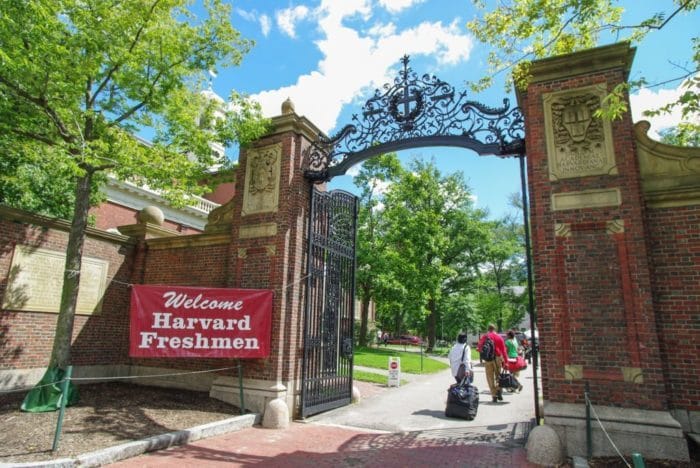Last Updated on March 9, 2025 by II Editor
Everyone loves an underdog story – that scrappy student who defied all odds and made it into one of the most prestigious universities in the world with less-than-stellar grades. But how low does your GPA have to be to get accepted into Harvard University? In this article, we’ll explore what GPA is truly needed, look at other factors that can boost your chances, and discuss strategies for presenting yourself as a strong candidate despite a lower GPA. By the end, you’ll have a well-rounded understanding of the lowest GPAs, unusual success stories, and tips for Crafting a compelling application. Let’s jump in!
No Single “Minimum” GPA
The first thing to understand is that Harvard, like most top colleges, does not have a defined “minimum” GPA for admission. GPAs exist on a continuum and are just one of many factors in a holistic review process. Admission is never guaranteed or denied based on any single number or stat.
However, looking at past admission rates and statistics can give us a general sense of what is competitive. According to data from Harvard’s Common Data Set, the middle 50% range of GPAs for first-year students upon admission in 2023 was between 3.91-4.0 unweighted on a 4.0 scale. The average high school GPA was around 3.97.
So while there is no cutoff, it is statistically very rare for students below a 3.7-3.8 unweighted GPA to gain admission. Anything significantly below a 3.5 would put an applicant at a major disadvantage without other extremely compelling application factors to balance it out.
Rare Exceptions Do Occur
Though the odds are long, it’s not theoretically impossible for someone with an even lower GPA to be accepted. A handful of published accounts over the years of students making it in with GPAs in the high 2.0 or low 3.0 range.
For example, one notable case from 2005 involved a student who graduated high school with a 2.5 GPA but went on to earn a 4.0 at community college before transferring to Harvard. Another student in the late 1990s overcame a 2.8 GPA with an otherwise stellar application profile including strong essays and extracurricular excellence in debate and math competitions.
While these stories grab headlines, admissions experts caution against using them as a realistic benchmark. Rare exceptions prove the rule rather than redefining it. Thousands of extremely qualified applicants with GPAs well above 3.5 are still denied admission each year. A very low GPA needs to be counterbalanced by truly extraordinary circumstances and accomplishments.
Other Application Factors That Matter
Since GPA alone rarely tells the full story, let’s explore some of the other key elements of a strong Harvard application that could potentially offset a lower academic record:
Test Scores
Standout standardized test scores on the ACT or SAT can demonstrate a student’s academic promise despite weaker grades. For Harvard in particular, scores at or above the 95th percentile (35 ACT composite or 1530-1600 SAT) start to open more doors.
Rigor of Course Load
Taking the most challenging classes available and excelling in Advanced Placement (AP), honours, International Baccalaureate (IB), or dual enrollment college courses shows motivation and intellectual curiosity beyond just GPA.
Essays and Recommendations
Compelling personal statements and letters of recommendation that illuminate a student’s character, passions, leadership abilities, and potential for growth can help admissions officers see past numbers on a transcript. Authentic self-awareness and insight are valued.
Extracurricular Excellence
Deep involvement and noteworthy achievements in areas like athletics, volunteering, research, the arts, or starting impactful organizations demonstrate leadership, time management skills, and a drive to make a positive difference. Quality often matters more than just quantity here.
Unusual Circumstances or Achievements
Overcoming a serious illness, injury or other personal hardship with resilience can make for a more compelling backstory. Awards, recognition or accomplishments beyond the typical high school experience including published works or starting a successful business as a teen also hold weight.
Crafting a Winning Application Narrative
For students with less-than-stellar GPAs, the key is weaving all these various application strengths together into a cohesive and convincing personal narrative. The essay prompts and letters of recommendation need to tell a story that addresses any academic weaknesses head-on while emphasizing redemptive qualities and future potential through examples:
- Explain candidly what factors led to struggles in high school coursework while taking ownership. Stress maturity gained rather than making excuses.
- Point to an upward academic trajectory like strong junior/senior year grades or post-secondary coursework to demonstrate the ability to succeed at Harvard.
- Illustrate how experiences outside the classroom cultivated important leadership skills, work ethic and perspective not necessarily reflected in GPA.
- Share anecdotes where diligence, perseverance and strength of character helped overcome challenges inside or outside the classroom.
- Connect personal interests and passions clearly to the intended field of study at college to show fit and motivation for success.
- Ask recommenders to specifically call out non-academic strengths and growth areas you highlighted to add credibility to your narrative.
Crafting this winning personal brand is crucial since the alternative interpretation is that a low GPA signals a lack of effort, potential or seriousness of purpose. Your essays need to prevent that assumption and instead paint the full picture of who you are and what you’re capable of accomplishing.
Alternative Routes with Post-Secondary Grades
For students who find their high school transcript presents too great an obstacle, strong performance in post-secondary programs like community college can open the door to transferring to a prestigious university later on.
Though Harvard is extremely selective as a transfer destination, earning an Associate’s Degree from a community college with a near-perfect 4.0 GPA demonstrates the ability and motivation to succeed at a higher level. Even racking up a semester or year of solid grades at a four-year college carries weight for any future transfer admissions decision.
This route requires patience and even more diligent performance, but it allows for personal redemption through post-secondary studies that reframe a student’s overall academic narrative and make their potential clearly evident to selective university admissions committees.
The Intangible “X Factor” and Fit
At the end of the day, no application statistic or factor exists in a vacuum. Admissions officers consider the whole picture holistically, weighing each applicant against the pool as individuals rather than just numbers. They aim to accept a diverse incoming class with a variety of backgrounds, talents and unique contributions who all demonstrate the potential to thrive and enrich the campus community.
For a low-GPA student, acing their interviews, coming across as authentic and passionate about their goals, and clearly connecting to Harvard’s mission and values could provide that little intangible “x factor” tilt in their favour. Fit cuts both ways – not only do they need to convince Harvard they belong, but Harvard also needs to feel like the right institutional fit and opportunity for their success. Belief in oneself as well as conveying why one belongs on that campus is so important.
Conclusion
While statistically rare, with an otherwise exceptional application profile it is theoretically possible for a student to gain admission to Harvard or other top universities with a GPA lower than usually expected. However, the odds remain heavily stacked against applicants without a track record of consistent strong academic performance.
Rather than a fixation on bare minimum GPAs, the focus should be a holistic presentation of all qualities, talents, experiences and potential through the various components of the application. Crafting a compelling personal narrative to explain any weaknesses is paramount.
For students who feel their high school transcript presents insurmountable barriers, post-secondary options can open new doors through redemptive academic performance. Ultimately, fit, authentic passion and that intangible spark tipping the scales in one’s favour may make the difference, so applicants should pursue their dreams while managing expectations appropriately. With diligence and perseverance, the impossible can sometimes become possible.










